Beef liver is a highly nutritious food that offers a wide range of health benefits. Packed with protein, vitamins, and minerals, it is a valuable addition to any diet. In this article, we will explore the nutritional benefits of beef liver, its potential health risks, and provide some delicious recipes to incorporate it into your meals. Whether you are looking to boost your immune system, support tissue repair, or improve energy production, beef liver can be a nutritious choice.
Key Takeaways:
- Beef liver is a highly nutritious food, rich in protein, vitamins, and minerals.
- It offers numerous health benefits, including immune system support, tissue repair, and energy production.
- Beef liver can be prepared in various delicious recipes to enhance its flavor.
- While there are health risks associated with consuming beef liver, moderate consumption can provide essential nutrients.
- Grass-fed beef liver may have additional phytonutrients and heart-healthy omega-3 fatty acids.
Nutritional Benefits of Beef Liver
Beef liver is considered a superfood due to its high nutritional content. It is rich in essential vitamins and minerals, including zinc, iron, phosphorus, selenium, and copper. These minerals support the immune system, bone and tooth health, metabolism, and energy production.
Beef liver is also a great source of complete protein, providing all the essential amino acids the body needs. Protein is important for tissue repair, muscle growth, and the production of enzymes and hormones.
Additionally, beef liver contains a wide range of vitamins, such as vitamin A and B vitamins. Vitamin A plays a crucial role in maintaining healthy vision, supporting the immune system, and promoting cell growth and differentiation. B vitamins, including B12 and folate, are involved in energy production, red blood cell formation, and the health of the nervous system.
Incorporating beef liver into your diet can provide many health benefits, supporting immune and nervous system function, growth, development, and reproductive health.
| Nutrient | Amount per 100g |
|---|---|
| Protein | 20.35g |
| Vitamin A | 16,814 IU |
| Vitamin C | 1.1mg |
| Iron | 4.78mg |
| Cholesterol | 274mg |
Health Risks of Beef Liver
While beef liver is highly nutritious, it is important to be aware of the potential health risks associated with its consumption. It is crucial to maintain a balanced approach to include beef liver in your diet and understand the potential consequences of excessive intake.
Vitamin A Toxicity
One of the primary concerns with consuming beef liver is the risk of vitamin A toxicity. Beef liver is rich in vitamin A, and excessive intake can lead to harmful effects on the body. Vitamin A toxicity can result in liver damage, vision problems, and bone pain. It is essential to consume liver in moderation and be cautious of total vitamin A intake from other sources.
Copper Toxicity
Be aware that beef liver contains high levels of copper. While copper is an essential mineral for the body, excessive intake can lead to copper toxicity. This can cause detrimental health issues, including kidney and heart failure. It is important to be mindful of copper consumption, especially if you have a medical condition that affects copper metabolism.
Antibiotics in Beef Liver
It is noteworthy that beef liver may contain detectable levels of antibiotics. These antibiotics are administered to the animals for various reasons, including disease prevention and growth promotion. However, the presence of antibiotics in beef liver raises concerns about potential health risks and the development of antibiotic resistance in humans. It is advisable to choose high-quality, organically raised beef liver to minimize antibiotic exposure.
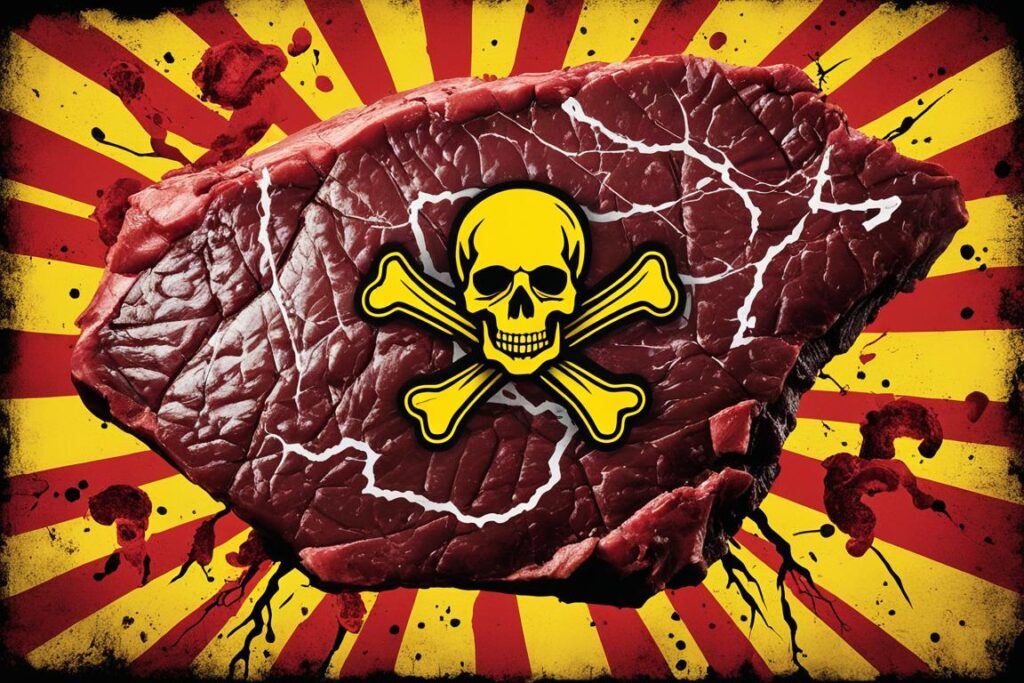
While beef liver offers many nutritional benefits, it is crucial to consume it in moderation and be aware of the potential health risks associated with its consumption. Specifically, the risks of vitamin A toxicity, copper toxicity, and exposure to antibiotics should be considered. By understanding these health risks and adopting a balanced approach, you can enjoy the nutritional benefits of beef liver while minimizing potential negative effects.
Beef Liver and Cholesterol
Beef liver is a highly nutritious food, packed with essential vitamins and minerals. However, it is also known for its high cholesterol content, containing approximately 274 milligrams per 100-gram serving.
While some individuals may choose to avoid consuming beef liver due to its cholesterol levels, it is important to understand the role of dietary cholesterol in heart disease risk. Research indicates that dietary cholesterol has little impact on heart disease compared to saturated fats.
When it comes to managing cholesterol levels, it is essential to focus on maintaining a balanced diet and limiting consumption of saturated fats from other sources, rather than solely avoiding cholesterol-rich foods like beef liver.
Here’s a comparison of cholesterol levels in 100-gram servings of popular high-cholesterol foods:
| Food | Cholesterol (mg) |
|---|---|
| Beef Liver | 274 |
| Shrimp (cooked) | 189 |
| Egg (whole) | 186 |
| Butter | 215 |
| Cheese (cheddar) | 105 |
Research suggests that dietary cholesterol has little impact on heart disease risk compared to saturated fats.
Remember, maintaining a healthy lifestyle and following dietary guidelines are key factors in supporting heart health. It is always recommended to consult with a healthcare professional or a registered dietitian for personalized advice on managing cholesterol levels and incorporating beef liver into a balanced diet.
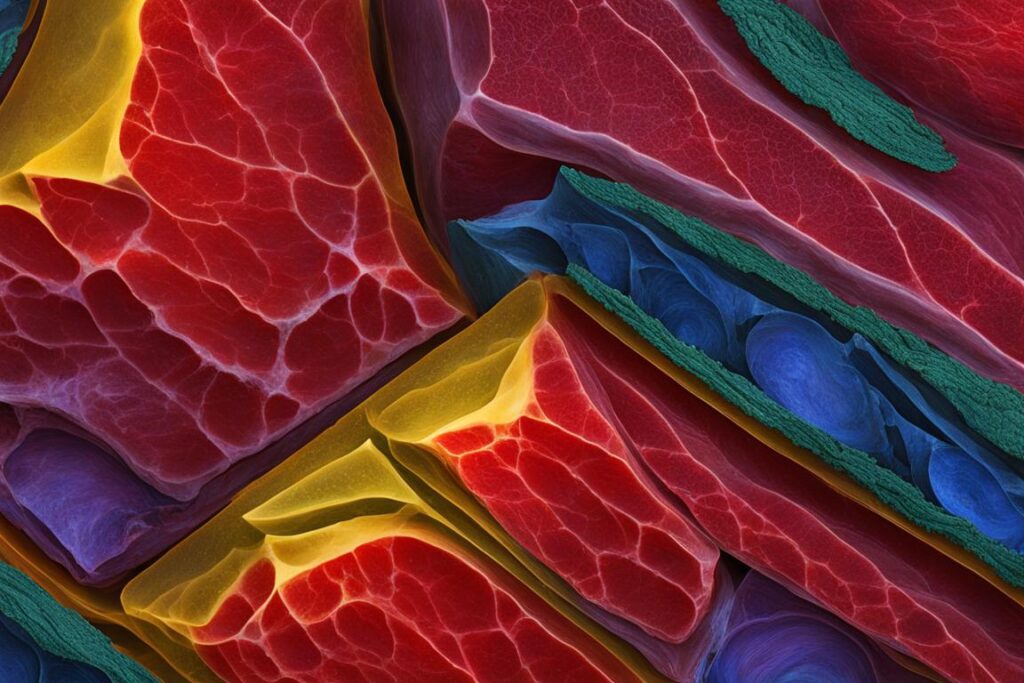
Benefits of Eating Beef Liver in Moderation
While there are risks associated with consuming beef liver, the potential health benefits of moderate consumption outweigh these concerns. Beef liver is an excellent source of protein, vitamins, and minerals that support immune system function, energy production, and overall health.
Incorporating beef liver into a well-rounded diet can provide essential nutrients and contribute to optimal health. Here are some key benefits of including beef liver in your diet:
- Boosts Immune System: Beef liver is rich in vitamin A, which plays a crucial role in supporting a healthy immune system. It helps to strengthen the body’s defense against infections and diseases.
- Aids in Energy Production: The high content of B vitamins, such as vitamin B12 and folate, in beef liver assists in energy production. These vitamins are involved in the metabolism of carbohydrates, fats, and proteins, providing essential fuel for the body.
- Supports Tissue Repair: The iron present in beef liver is essential for the production of red blood cells, which transport oxygen throughout the body. Adequate iron intake promotes proper tissue repair and ensures optimal oxygenation of cells.
- Provides Essential Minerals: Beef liver is a rich source of minerals like zinc, copper, and selenium. These minerals contribute to various functions in the body, including immune system health, metabolism, and antioxidant protection.
Adding beef liver to your diet in moderation can significantly enhance your overall health and well-being.
It is recommended to consume beef liver in moderation and follow appropriate dietary guidelines. While beef liver offers numerous health benefits, excessive consumption may lead to vitamin A toxicity or copper overload, as mentioned in the previous section. Moderation is key to harnessing the nutritional advantages of beef liver while minimizing potential risks.
Remember, a balanced diet comprises a variety of nutrient-dense foods, including vegetables, fruits, whole grains, lean proteins, and healthy fats. Adding beef liver as part of a well-rounded meal plan can be a valuable strategy to optimize your nutritional intake and promote overall health and vitality.
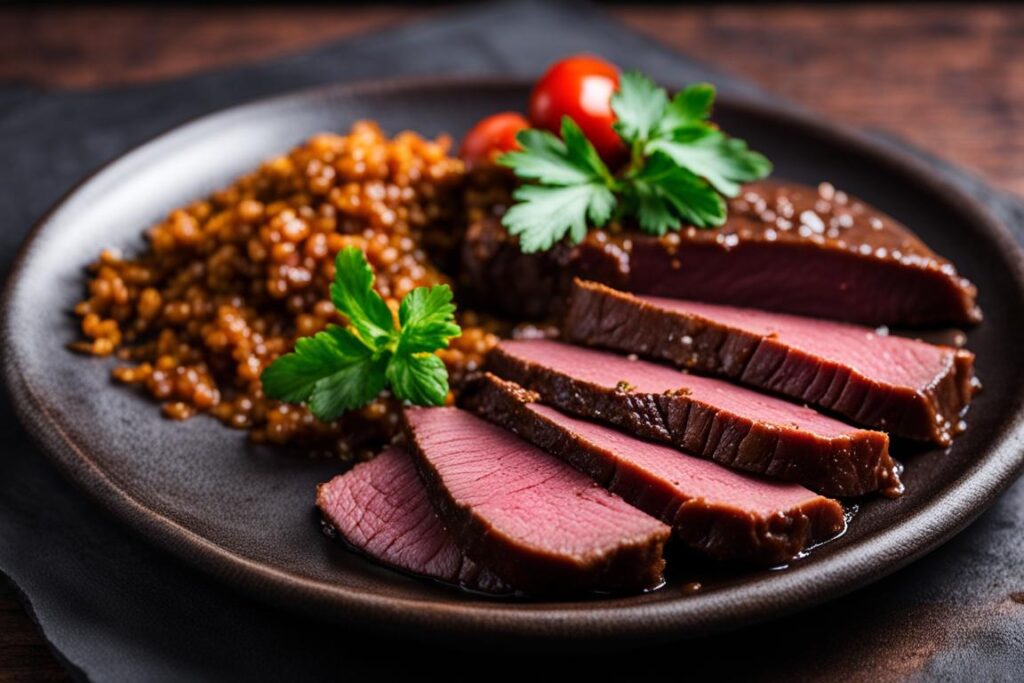
Considerations for Specific Populations
While beef liver is a nutritious food, it is important to exercise caution when consuming it, especially for specific populations. Understanding the potential risks and considerations associated with beef liver consumption can help individuals make informed dietary choices. Two specific populations that should take note are pregnant individuals and those who suffer from gout.
Beef Liver and Pregnancy
Pregnant individuals should be mindful of their vitamin A intake when consuming beef liver. While beef liver is a rich source of vitamin A, excessive amounts can lead to birth defects. It is recommended for pregnant individuals to consult with their healthcare professional to determine an appropriate level of vitamin A intake during pregnancy.
Beef Liver and Gout
Gout patients may want to limit or avoid beef liver consumption due to its high levels of purines, which can increase uric acid levels and trigger gout attacks. Purines are naturally occurring compounds found in certain foods, and high-purine foods can contribute to the buildup of uric acid in the body. Individuals with gout should work with their healthcare professional to develop a dietary plan that helps manage their condition.
It is important for both pregnant individuals and those with gout to consult with a healthcare professional before incorporating beef liver into their diet. A healthcare professional can provide personalized advice based on individual health status, needs, and dietary requirements.

It’s crucial to prioritize one’s health and follow appropriate dietary guidance, especially during pregnancy and for those managing medical conditions like gout. By being mindful of the potential risks associated with beef liver consumption and seeking professional advice, individuals can make informed decisions about incorporating this nutritious food into their diet.
Delicious Beef Liver Recipes
Beef liver is a versatile ingredient that can be transformed into delicious dishes to delight your taste buds. Whether you’re a fan of classic flavors or looking to experiment with new culinary creations, these beef liver recipes are sure to satisfy your cravings. From hearty liver and onions to tangy marinated liver, here are some tasty recipes to try:
Liver and Onions
This traditional dish is a favorite among beef liver enthusiasts. The combination of tender liver and caramelized onions creates a savory flavor profile that is hard to resist. To prepare liver and onions, start by marinating the liver in a mixture of red wine vinegar and honey for about 30 minutes. This helps to reduce the strong flavor and adds a touch of sweetness. Next, fry the liver with sliced onions until golden brown and serve hot. This classic recipe is perfect for a comforting and satisfying meal.
Marinated Liver
If you prefer a tangy and zesty flavor, marinated liver is a great choice. To make this dish, slice the liver and marinate it overnight in a mixture of lemon juice or water with vinegar, garlic, and bay laurel leaf. The marinade helps to tenderize the liver while infusing it with delightful flavors. After marinating, fry the liver until cooked through and serve with your favorite side dishes. The result is a succulent and tangy dish that will leave you wanting more.
Minced Livers
If you’re looking for a creative way to incorporate beef liver into your meals, minced livers are a fantastic option. To prepare minced livers, sauté chopped onions with the liver until both are cooked through. Then, process them together in a food processor or blender to achieve a fine mince. This minced liver can be used as a substitute for ground beef in various recipes, such as meatballs, burgers, or meat sauces. It’s a clever way to enjoy the nutritional benefits of beef liver while adding a unique twist to your favorite dishes.
These recipes not only help to enhance the flavor of beef liver but also make it more appealing to those who may be hesitant to try it. By incorporating a variety of ingredients and flavors, these dishes provide a satisfying and enjoyable dining experience that showcases the versatility of beef liver.
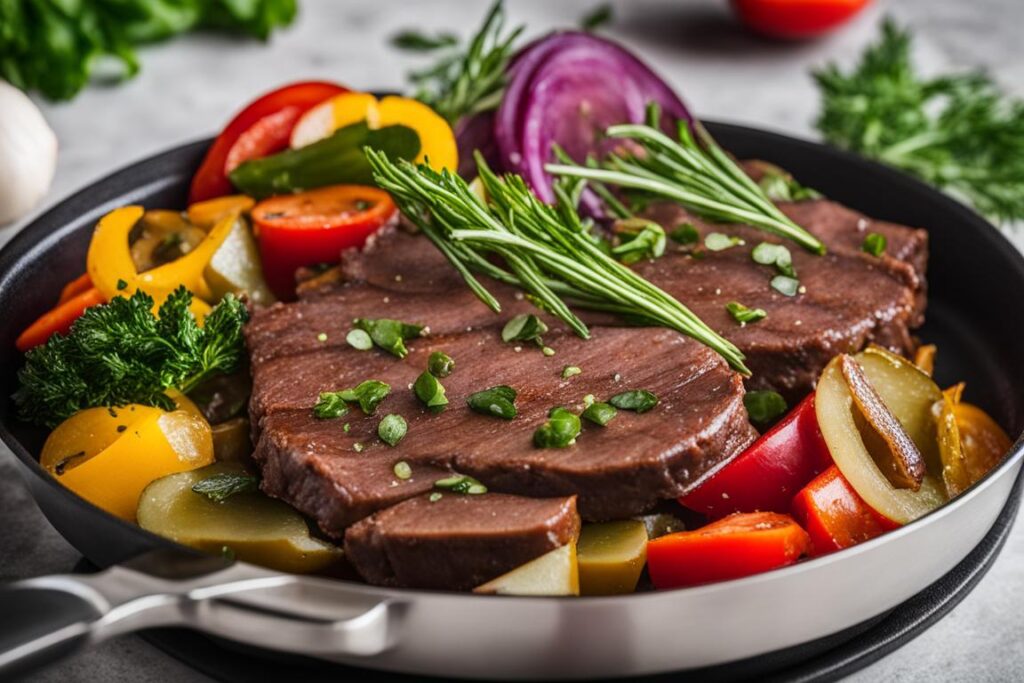
Remember, cooking beef liver requires some care to achieve the desired texture and flavor. Overcooking can result in a tough and dry liver, while undercooking may leave it unpleasantly raw in the center. It is recommended to follow cooking instructions carefully and pay attention to cooking times to ensure you achieve the perfect balance.
Beef Liver Supplements
For individuals who do not enjoy the taste of beef liver or have specific dietary restrictions, beef liver supplements offer a convenient way to incorporate the nutritional benefits of beef liver into one’s diet. These supplements are available in capsule form and provide an alternative for individuals who may not consume sufficient amounts of beef liver through their regular meals.
Beef liver supplements contain concentrated amounts of the essential nutrients found in beef liver, including protein, vitamins, and minerals. They can be a beneficial addition to a balanced diet, especially for those who may have difficulty obtaining these nutrients from other sources.
It is important, however, to consult with a healthcare professional before starting any new dietary supplement, including beef liver supplements. This is crucial to ensure proper dosage and suitability, as individual nutrient needs may vary.
When choosing beef liver supplements, it is essential to opt for reputable brands and products that undergo rigorous testing for quality and purity. Look for supplements that are made from high-quality beef liver and certified by respected regulatory authorities.
While beef liver supplements can provide nutritional benefits, it is important to remember that they should not replace a varied and balanced diet. Whole foods, including beef liver, offer a range of additional nutrients and bioactive compounds that may not be present in supplement form.
Incorporating beef liver supplements into one’s diet can be an effective way to reap the nutritional benefits of beef liver, especially for individuals who may have dietary restrictions or personal preferences that limit their consumption of beef liver. Nevertheless, it is recommended to consult with a healthcare professional to ensure the appropriate use and dosage of these dietary supplements.
Grass-Fed Beef Liver
When it comes to the nutritional content of beef liver, studies suggest that opting for grass-fed varieties may provide additional benefits. Grass-fed beef liver has been found to contain more phytonutrients compared to livers from grain-fed beef cattle. These phytonutrients, which are plant-based compounds, have antioxidant and anti-inflammatory properties that can contribute to overall health and well-being.
In addition to phytonutrients, grass-fed beef liver is also higher in omega-3 fatty acids. These heart-healthy fats are known for their anti-inflammatory properties and have been linked to various health benefits, including improved brain function and heart health.
However, it is important to note that the term “grass-fed” does not necessarily mean the meat is free of antibiotics or growth hormones. Only USDA organic foods can guarantee such claims. Therefore, individuals interested in maximizing the nutritional content of beef liver should consider opting for grass-fed, organic varieties to ensure they are getting the highest quality product.
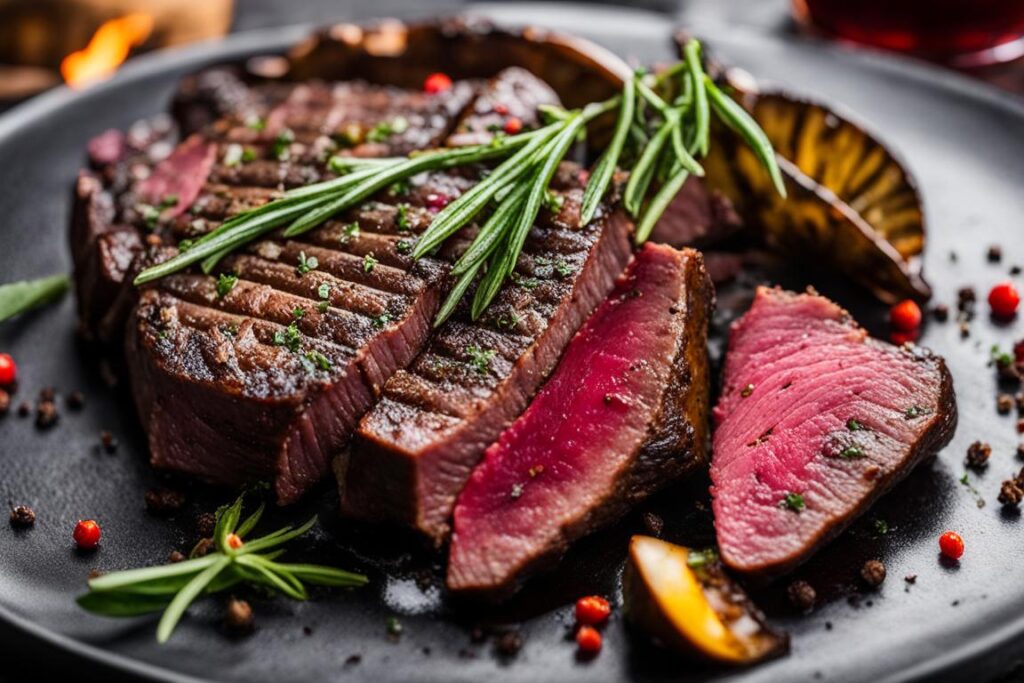
| Nutrition Content Comparison | Grass-Fed Beef Liver | Grain-Fed Beef Liver |
|---|---|---|
| Phytonutrients | Higher levels | Lower levels |
| Omega-3 Fatty Acids | Higher levels | Lower levels |
| Antibiotics and Growth Hormones | Varies; may still be present | Varies; may still be present |
As shown in the comparison table above, grass-fed beef liver comes out on top in terms of phytonutrients and omega-3 fatty acids. However, it is important to consider individual dietary preferences and requirements when making food choices.
Conclusion
Beef liver is a highly nutritious food that provides a wide range of health benefits. Its rich protein content supports muscle growth and repair, while its abundance of essential vitamins and minerals contributes to overall well-being. Incorporating beef liver into a balanced diet can help boost the immune system, promote energy production, and support various bodily functions.
However, it is important to consume beef liver in moderation and consider dietary considerations. While it offers numerous health benefits, excessive intake can lead to vitamin A toxicity or copper overload. It is advisable to consult with a healthcare professional to determine the appropriate portion size and frequency of consumption based on individual needs and health conditions.
Incorporating beef liver into a healthy lifestyle can be a valuable addition to one’s diet. It can be enjoyed in various delicious recipes that help mask its distinct flavor, making it more appealing to those who may be hesitant to try it. By following dietary recommendations and enjoying beef liver in moderation, individuals can reap its nutritional benefits while minimizing potential risks.
Also Read : Beef Tripe Benefits & Cooking Tips – Quick Guide
FAQ
Q: What are the health benefits of eating liver?
A: Liver is a nutritional powerhouse, providing high levels of protein, vitamins A and B, iron, and other essential nutrients. It can contribute to improved energy levels, brain function, and overall health.
Q: What nutrients does liver provide?
A: Liver provides a rich source of protein, iron, vitamin A, vitamin B12, riboflavin, and other essential vitamins and minerals that are crucial for maintaining good health.
Q: Is it safe to eat liver?
A: Yes, consuming liver in moderation is considered safe and can be highly beneficial due to its high nutritional content. However, it’s important to avoid excessive consumption due to its high levels of vitamin A and potential toxin accumulation.
Q: How does liver compare to muscle meats in terms of nutrition?
A: Liver is significantly higher in nutrients such as vitamin A, vitamin B12, and iron compared to muscle meats. It is also lower in calories and fat, making it a healthier choice for obtaining essential nutrients.
Q: Are there any risks associated with eating liver?
A: Overconsumption of liver may lead to excessive intake of vitamin A and potential toxin accumulation, which can have adverse health effects. It’s important to consume liver in moderation and consult a healthcare professional if you have any concerns.
Q: What are some healthy recipes for preparing liver?
A: Liver can be prepared in various ways, such as sautéing with onions and garlic, adding to stir-fries, or incorporating into pâtés and terrines. It can also be used to make nutrient-rich liver pâté or added to stews and casseroles for an added nutritional boost.
Q: How can liver be included as part of a balanced diet?
A: Liver can be included in a balanced diet by incorporating it into meals a few times a month to benefit from its nutritional content. It can be paired with a variety of fruits, vegetables, and whole grains to create well-rounded, nutritious meals.
Q: What are the nutrition facts of a 3-ounce serving of beef liver?
A: A 3-ounce serving of beef liver provides approximately 20 grams of protein, high levels of vitamin A, vitamin B12, and iron, while being relatively low in calories and fat compared to other cuts of meat.
Q: Is it advisable to take beef liver supplements?
A: It is recommended to obtain essential nutrients from a balanced diet that includes a variety of nutrient-rich foods. While beef liver supplements are available, it’s important to consult with a healthcare professional before considering their use.
Q: How does liver contribute to increasing protein intake and supporting overall health?
A: Liver is high in protein and contains essential amino acids vital for muscle growth, maintenance, and overall bodily functions. Including liver in the diet can help individuals meet their daily protein needs and support overall health and wellness.


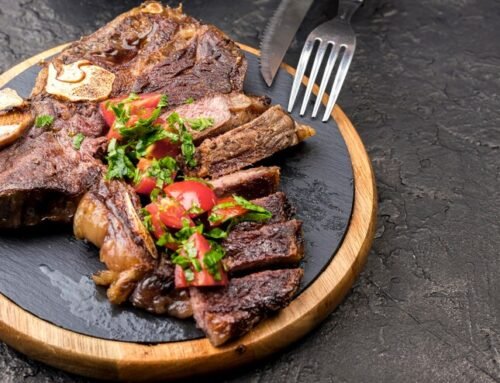


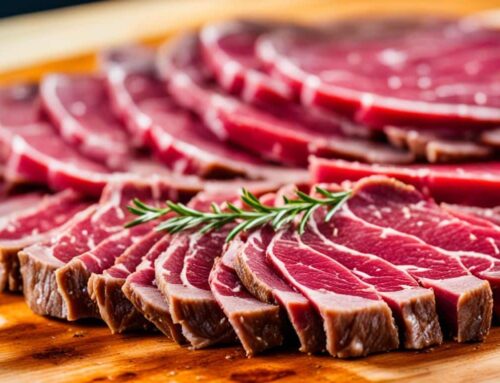
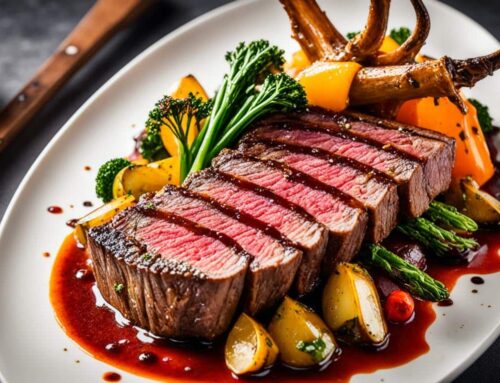
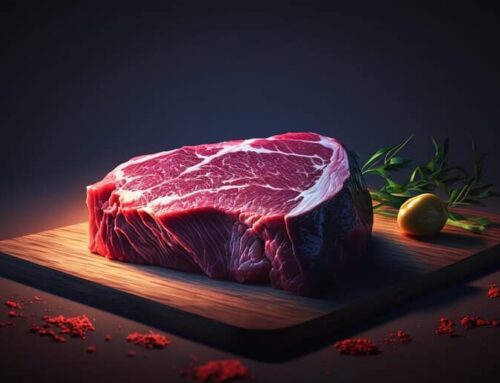
Leave A Comment